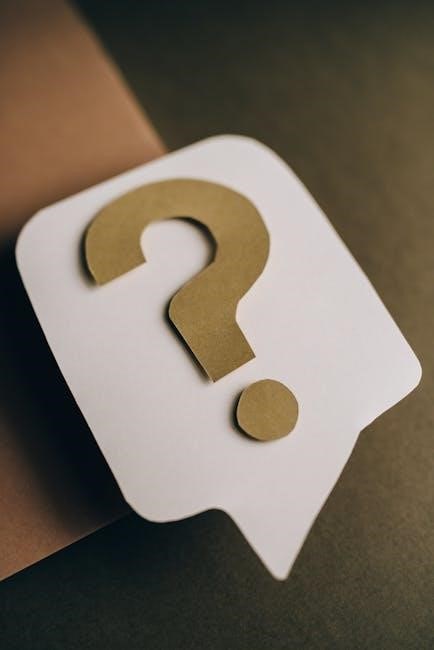Guiding questions are foundational tools that help focus research and learning by prompting deeper exploration and critical thinking․ They serve as a roadmap, directing inquiry toward meaningful outcomes․
1․1 Definition and Purpose
A guiding question is a thought-provoking inquiry designed to direct research, learning, or discussion․ It serves as a focal point, helping to clarify objectives and organize ideas․ The purpose of a guiding question is to encourage critical thinking, exploration, and deeper understanding of a topic․ By framing a central issue or problem, it provides direction for investigation and analysis․ Guiding questions are essential in both educational and research contexts, as they help individuals identify key themes, evaluate information, and form meaningful conclusions․ They are often open-ended, prompting further inquiry rather than seeking simple answers; Effective guiding questions are clear, specific, and relevant, ensuring that the exploration remains focused and purposeful․ They act as a foundation for meaningful discovery and learning․
1․2 Importance in Research and Learning
Guiding questions play a vital role in research and learning by providing clear direction and focus․ They help researchers and learners stay aligned with objectives, ensuring efforts are concentrated on relevant areas․ By framing central issues, guiding questions enable the exploration of multiple perspectives, fostering a deeper understanding of complex topics․ In educational settings, they enhance student engagement by encouraging active thinking and participation․ Guiding questions also promote critical thinking, as they often require the analysis and synthesis of information․ Additionally, they facilitate effective time management by streamlining the research process, reducing the likelihood of tangential investigations․ Overall, guiding questions are indispensable tools that enhance the efficiency, depth, and quality of both research and learning experiences․

The Role of Guiding Questions in Research
Guiding questions streamline research by focusing inquiries, ensuring relevance, and enhancing efficiency, directing investigations toward meaningful outcomes and improving overall research quality․
2․1 How Guiding Questions Focus Research
Guiding questions narrow the scope of research by setting clear parameters, ensuring that investigations remain targeted and aligned with objectives․ They help eliminate irrelevant information, streamline data collection, and maintain focus on key areas․ By framing the research with specific queries, these questions guide the direction of inquiry, enabling deeper exploration of topics․ This focused approach enhances the clarity and coherence of the research process, leading to more relevant and actionable results․ Effective guiding questions also promote critical thinking, encouraging researchers to probe beyond surface-level information and uncover meaningful insights, which is essential for producing high-quality, impactful research outcomes․
2․2 Examples of Effective Guiding Questions
Effective guiding questions are clear, specific, and aligned with research objectives․ For instance, “What are the primary causes of climate change?” focuses on identifying key factors․ Another example, “How does renewable energy impact carbon emissions?” explores relationships between variables․ Questions like “What strategies can reduce urban pollution?” guide toward actionable solutions․ In education, questions such as “How does this text relate to modern society?” encourage deeper analysis․ These examples demonstrate how guiding questions refine research by targeting specific outcomes, reducing ambiguity, and ensuring relevance․ They help researchers stay focused, fostering efficient data collection and analysis․ Well-crafted guiding questions are essential for producing meaningful and impactful results, whether in academic, professional, or everyday contexts․

Developing a Guiding Question
Developing a guiding question involves identifying the research objective and narrowing the topic to ensure clarity and focus, leading to a well-defined inquiry process․
3․1 Identifying the Research Objective
Identifying the research objective is the first step in developing a guiding question․ This involves understanding the purpose of the inquiry and what needs to be explored․ It requires narrowing down the topic to a specific area of interest and determining the key issues that need to be addressed․ By clearly defining the research objective, researchers can ensure that their guiding question is focused and relevant․ This step helps in avoiding broad or vague questions that may not yield meaningful results․ A well-defined objective also enables the researcher to allocate resources effectively and stay on track throughout the investigation․ Ultimately, identifying the research objective lays the foundation for a structured and purposeful inquiry process․
3․2 Narrowing Down the Topic

Narrowing down the topic is crucial for creating an effective guiding question․ It involves refining broad ideas into specific, manageable areas of focus․ This step ensures that the research remains concentrated and avoids overwhelming breadth․ Techniques such as brainstorming, mind mapping, and preliminary research can help identify key aspects of the topic․ By focusing on specific angles or components, researchers can develop questions that are both meaningful and feasible to investigate․ Narrowing the topic also enhances clarity, making it easier to allocate time and resources effectively․ A well-defined focus ensures that the guiding question is precise and directs the research toward achieving clear, actionable outcomes․ This process is essential for maintaining direction and achieving depth in the inquiry․

Characteristics of a Strong Guiding Question
A strong guiding question is clear, specific, relevant, and focused, ensuring it effectively directs research and learning while sparking critical thinking and engagement․
4․1 Clarity and Specificity
Clarity and specificity are essential for effective guiding questions․ A clear question avoids ambiguity, ensuring understanding․ Specificity narrows focus, preventing broad or vague inquiries․ Together, they enable precise research and meaningful analysis․

4․2 Relevance and Focus
A strong guiding question must be both relevant and focused․ Relevance ensures the question aligns with the research objective, making it meaningful and purposeful․ Focus prevents the inquiry from becoming too broad, keeping it targeted and manageable․ To achieve this, the question should avoid unnecessary complexity and unrelated topics․ Using specific keywords and clear parameters helps maintain focus; For example, employing advanced search tools like file type filters or excluding certain terms can refine the scope․ Ensuring the question directly addresses the core issue enhances its effectiveness․ A well-crafted, relevant, and focused guiding question guides the research efficiently, leading to more precise and actionable outcomes․

Using Guiding Questions in Education
Guiding questions are essential in education, fostering active learning, student engagement, and critical thinking by encouraging deeper exploration and meaningful inquiry in academic settings․
5․1 Enhancing Student Engagement
Guiding questions play a pivotal role in enhancing student engagement by making learning interactive and relevant․ When students are presented with thoughtful questions, they are more likely to participate actively in discussions and explore topics with curiosity․ Such questions encourage them to think critically and connect new information to their existing knowledge, fostering a deeper understanding of the subject matter․ Additionally, guiding questions can be tailored to address various learning styles, ensuring that every student feels involved and motivated․ By incorporating these questions into lesson plans, educators can create a dynamic learning environment that promotes collaboration and intellectual growth, leading to higher levels of student engagement and academic success․
5․2 Promoting Critical Thinking
Guiding questions are instrumental in fostering critical thinking by encouraging students to analyze information, evaluate evidence, and form well-supported conclusions․ These questions prompt students to question assumptions, explore multiple perspectives, and synthesize ideas․ By requiring students to think deeply about a topic, guiding questions help them develop the ability to identify biases, challenge arguments, and solve complex problems․ This approach cultivates independent thinking and prepares students to navigate real-world scenarios effectively․ Moreover, guiding questions encourage students to reflect on their own learning processes, enhancing their metacognitive skills․ Ultimately, they serve as a powerful tool for transforming passive learners into active thinkers capable of tackling challenges with confidence and intellectual rigor․

Advanced Techniques for Refining Guiding Questions
Advanced techniques involve refining questions for precision, using search operators, and leveraging tools to enhance clarity and relevance, ensuring research is efficient and targeted․

6․1 Applying Search Operators
Search operators are powerful tools that refine guiding questions by narrowing search results․ Techniques like using filetype: to find specific documents (e․g․, PDFs) or intitle: to locate keywords in page titles enhance precision․ The site: operator limits results to particular websites, while excluding terms with a minus sign (-) removes irrelevant content․ Advanced operators like OR or AND help broaden or narrow searches, respectively․ These tools enable researchers to focus on high-quality, relevant sources, making their guiding questions more effective․ By mastering these operators, users can streamline their research process and uncover more targeted information, ensuring their inquiries yield meaningful and accurate results․ This approach is especially useful for refining guiding questions in academic or professional settings, where precision is key to producing robust outcomes․
6․2 Utilizing Advanced Search Tools
Advanced search tools enhance the refinement of guiding questions by offering sophisticated filters and options․ Google’s Advanced Search allows users to filter results by date, file type, and domain, ensuring relevance․ Bing’s video search enables users to specify video length and resolution, aiding in focused research․ Additionally, tools like site-specific searches (e․g․, site:edu) target credible sources․ These tools help refine guiding questions by eliminating irrelevant content and pinpointing precise information․ They also support complex queries, such as excluding terms or searching within specific domains․ By leveraging these advanced tools, researchers can streamline their process, ensuring their guiding questions yield accurate and relevant results, thereby enhancing the overall quality of their inquiry and analysis․
